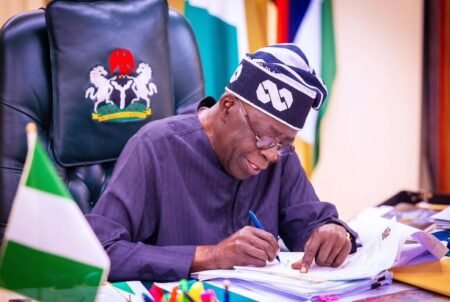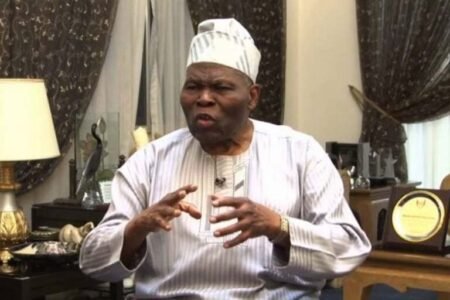The National Industrial Court, Abuja, on Monday restrained the Petroleum and Natural Gas Senior Staff Association of Nigeria (PENGASSAN) from embarking on its planned industrial action against Dangote Petroleum Refinery and Petrochemicals FZE.
Justice Emmanuel Danjuma Subilim, in a ruling, barred PENGASSAN from halting crude oil and gas supply to the Dangote Refinery.
Listed as defendants in the suit are the Nigerian National Petroleum Company Limited (NNPCL), the Nigerian Midstream and Downstream Petroleum Regulatory Authority, and the Nigerian Upstream Petroleum Regulatory Commission (NUPRC).
Dangote Refinery, in an ex parte application filed by its counsel, George Ibrahim, secured the interim order against the defendants.
The refinery filed the motion after PENGASSAN went on strike in protest against the laying off of over 800 workers by the refinery.
Ibrahim, in the motion, sought an order of interim injunction restraining the 1st Defendant (NNPCL), its members, agents, servants, privies, representatives, assigns, or whosoever described, from directing or effecting a halt in the supply of crude oil and gas to the Claimant.
As stated in the directives issued by the 1st Defendant on September 26, 2025, he further prayed the Court to prevent them from taking any industrial action against the Claimant with the intent of crippling operations, blocking access roads, obstructing vehicular movement, or otherwise disrupting the operations of the Claimant or the licensees of the 2nd to 4th Defendants while the motion on notice is being heard and decided.
He also sought “an order of interim injunction restraining the 2nd–4th Defendants, their employees, members, agents, servants, privies, representatives, licensees, or assigns, however described, from giving effect to the directives of the 1st Defendant to halt the supply of crude oil and gas to the Claimant; or joining, continuing, embarking on, or in any manner participating in the planned industrial action of the 1st Defendant and its affiliates or cronies or any other strike whatsoever against the Claimant/Applicant, with a view to frustrating its business and operations, pending the hearing and determination of the motion on notice.”
Ibrahim contended that the applicant is a legally authorized petroleum production and distribution business that produces and refines petroleum and petrochemical goods for Nigerian consumers. He emphasized that the business offers vital services that are vital to the Nigerian economy and the general welfare of the populace.
NNPC, NUPRC, NMDPRA shut as PENGASSAN begins strike
PENGASSAN begins strike Monday over Dangote Refinery layoffs
In addition, he argued that recent instances of sabotage by certain workers at the claimant’s facility had generated serious health and safety issues, requiring a reorganization process that resulted in the disengagement of several employees.
He pointed out that a memo dated September 25, 2025, informed every employee of this.
He claims that early on September 26, 2025, the Claimant learned of online rumors that Nigerian employees had been fired for joining the 1st Defendant’s bargaining association.
He claimed that the Claimant’s management quickly released a press release denying the accusation and making it clear that the business did not oppose unionization, which it acknowledges as a constitutional right.
He emphasized that the refinery employs more than 3,000 Nigerians and that the reorganization effort, which was required due to sabotage and safety issues, only had a minor impact on a small percentage of the workers.
Counsel also informed the Court that the First Defendant, through its General Secretary, Lamumba Okugbawa, threatened to bring the Claimant to its knees unless the impacted employees—who were reportedly over 800—were reinstated. The letter was dated September 26, 2025.
“The 1st Defendant issued a press statement on September 26, 2025, erroneously describing the disengagement exercise as anti-labor practices and alleging that the workers were victimized for joining the union, which is patently incorrect,” Ibrahim submitted.
He continued by saying that despite the Claimant’s explanations, the First Defendant grew even more enraged and ordered its executives and members in the licensees of the Second through Fourth Defendants, who provide the Claimant with gas and crude oil, to stop the supply in order to paralyze its operations.
“The 2nd–4th Defendants are on standby to implement the directives of the 1st Defendant through their agents and licensees, with a view to cutting off supply of crude oil and gas to the Claimant, thereby crippling its operations, unless this Honorable Court intervenes,” Ibrahim argued.
He said that the First Defendant was determined to fulfill its threat to stop the Claimant’s operations unless the Court intervened, knowing the strength of its membership across the nation.
“The Claimant’s plant was constructed at a cost exceeding $20bn by its promoters to address Nigeria’s decades-long energy challenges. The refinery has been making substantial contributions to the economy and meeting consumer demand. If the 1st Defendant’s threat is carried out, Nigeria would be plunged back into the dark days of energy shortages, with devastating consequences for consumers and the economy,” he submitted.
He claims that without formally resolving their differences with the Claimant as required by law, the First Defendant and its members have developed preparations to launch an industrial action that might seriously impair the Claimant’s ability to serve the Nigerian public and economy.
In his succinct ruling regarding the ex parte application, Justice Subilim determined that the applicant had the advantage of convenience because continuing the threatened industrial action would cause irreversible harm to the company’s operations and jeopardize its ability to provide the Nigerian public with necessary services.
In order to maintain industrial peace and ensure the ongoing supply of necessary services while the substantive suit is being heard and decided, the judge decided that it was in the interest of justice to impose restrictions on the respondents.
As a result, Justice Subilim issued the restraining order and ordered that it be served to the defendants immediately along with the notice petition.
The Court ruled that the order would only be in effect for seven days. After that, the hearing of the motion on notice was postponed until October 13.











